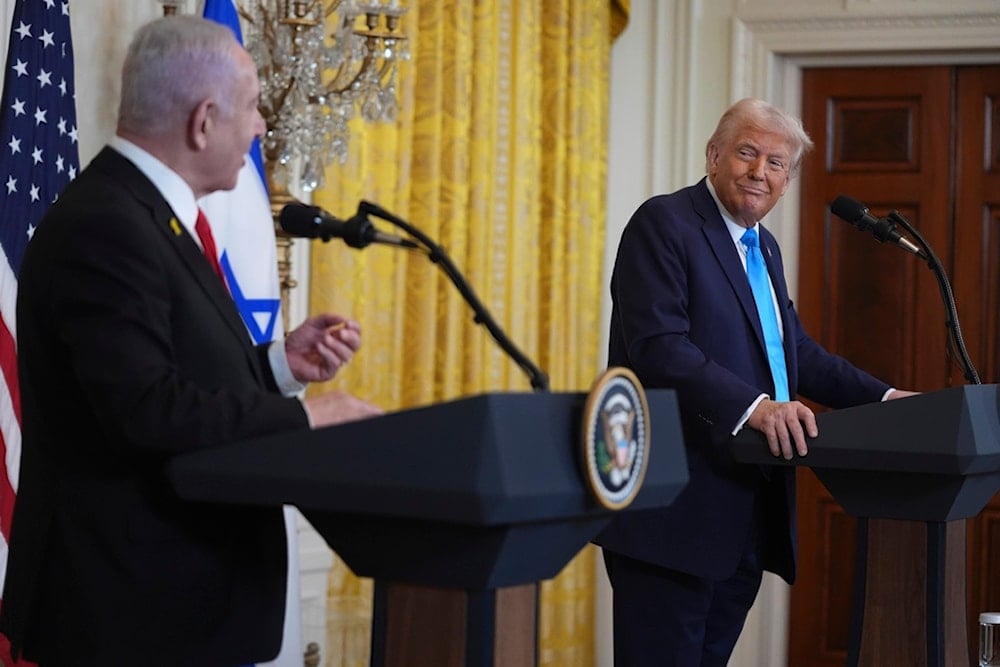Once in lockstep, Trump and Netanyahu no longer in sync: NYT
Signs indicate that the two leaders are divided over major policies after Trump engaged in talks with Iran, cut a deal with Ansar Allah, and diverged on Gaza war strategy.
-

President Donald Trump listens as "Israel's" Prime Minister Benjamin Netanyahu speaks during a news conference in the East Room of the White House, Feb. 4, 2025, in Washington (AP, File)
US President Donald Trump and Israeli Prime Minister Benjamin Netanyahu are both politically divisive, fiercely combative, and possess outsized egos, but as Trump prepares to travel to the Middle East next week, the region’s future may hinge on the two men's relationship, The New York Times reported.
When Netanyahu met Trump at the White House in February, the two leaders were in lockstep on major Middle East policies. Trump had just designated the Ansar Allah movement in Yemen as a "terrorist organization". They both spoke about preventing Iran from obtaining a nuclear bomb, and Trump even floated the idea of displacing Palestinians from Gaza.
Speaking in the Oval Office, Netanyahu told Trump in front of the cameras, “You say things others refuse to say."
“And then, after the jaws drop, people scratch their heads. And they say, ‘You know, he’s right,’” he added.
Read more: Israeli media blasts Netanyahu over US ties, war failures
Trump’s shift on Iran and Yemen surprises 'Israel'
But two months later, during another White House visit in April, Netanyahu sat in near-total silence for over half an hour as Trump rambled on about topics unrelated to "Israel".
That meeting underscored the growing rift between the two leaders, who now increasingly diverge on some of the most critical security issues facing "Israel".
As Trump heads to the Middle East this week for his first major foreign trip, he has so far rejected Netanyahu’s desire for a joint military operation to eliminate Tehran’s nuclear capabilities. Instead, Trump has initiated talks with Iran, prompting Netanyahu to warn that “a bad deal is worse than no deal.”
Last week, Trump announced a deal with Ansar Allah to halt US airstrikes on the group, which, in turn, agreed to stop attacking US ships in the Red Sea. According to Israeli officials, Trump’s announcement, which came just days after a Yemeni missile struck Tel Aviv’s main airport, triggering heavy Israeli airstrikes on Yemeni areas, was a surprise to Netanyahu.
Read more: Trump cut off contact with Netanyahu: Israeli media
US isn't required to get permission from 'Israel'
In a video posted on X, Netanyahu responded to Trump’s announcement by saying, “Israel will defend itself by itself. If others would join us, our American friends, very well. If they don’t, we will defend ourselves.”
Mike Huckabee, the US ambassador to "Israel", said in an Israeli television interview on Friday that “the United States isn't required to get permission from Israel.”
Read more: US pressures 'Israel' for Gaza deal; Witkoff's Israeli rebuke leaked
Gaza war exposes strategic differences
There are also signs of discord over Gaza. While Trump has strongly supported Netanyahu’s approach to the war, offering virtually no public criticism of "Israel’s" escalating bombardment and its blockade on food, fuel, and medicine since the ceasefire collapsed two months ago, his envoys are still trying to broker a deal to end the war.
What’s at stake is both the immediate and long-term security of a region long plagued by war.
Analysts in the Middle East and the United States say the course of history may partially depend on whether Trump and Netanyahu can overcome their differences amid a time of major geopolitical shifts.
Read more: Trump-Netanyahu rift grows, US pursues Mideast plans without 'Israel'

 4 Min Read
4 Min Read










